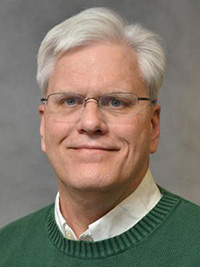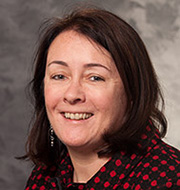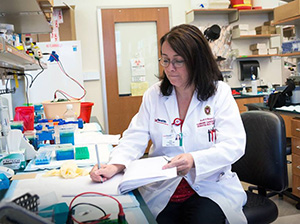Dec. 29, 2016:
Members of the Big Ten Cancer Research Consortium Steering Committee recently appointed Robert Kratzke, MD, as the committee’s first chair, and Ruth O’Regan, MD, as its vice chair. Each will serve a one-year term, with Dr. O’Regan serving as chair in the subsequent year.
 Kratzke is a lung cancer researcher at Masonic Cancer Center, University of Minnesota and associate professor in the University of Minnesota Medical School’s Department of Medicine. He has served as the University of Minnesota steering committee representative since 2014, and is a member of the Big Ten CRC’s Thoracic Clinical Trial Working Group.
Kratzke is a lung cancer researcher at Masonic Cancer Center, University of Minnesota and associate professor in the University of Minnesota Medical School’s Department of Medicine. He has served as the University of Minnesota steering committee representative since 2014, and is a member of the Big Ten CRC’s Thoracic Clinical Trial Working Group.
“This is an exciting announcement for Dr. Kratzke and the Masonic Cancer Center,” said Douglas Yee, MD, director of the Masonic Cancer Center. “Dr. Kratzke’s expertise in conducting complex, multi-center cancer clinical trials, as well as his track record for mentoring junior researchers, made him a natural choice for the leadership of the Big Ten CRC Steering Committee. This role further highlights his leadership of the 22 Masonic Cancer Center investigators participating in the 12 Big Ten CRC clinical trial working groups.”
Read more about Dr. Kratzke and the Masonic Cancer Center.
 O’Regan is division head, hematology/oncology, and associate director of faculty development and education at the University of Wisconsin Carbone Cancer Center. She is a breast cancer researcher and physician, and has served as the University of Wisconsin’s representative on the steering committee since 2015. She is a member of the Big Ten CRC’s Breast Clinical Trial Working Group.
O’Regan is division head, hematology/oncology, and associate director of faculty development and education at the University of Wisconsin Carbone Cancer Center. She is a breast cancer researcher and physician, and has served as the University of Wisconsin’s representative on the steering committee since 2015. She is a member of the Big Ten CRC’s Breast Clinical Trial Working Group.
“We are not surprised by Dr. O’Regan’s election to the vice chair position of the Big Ten CRC Steering Committee as she is an internationally recognized leader in the development of new treatments for cancer especially in breast cancer,” said Howard Bailey, MD, director of the University of Wisconsin Carbone Cancer Center. “Dr. O’Regan and the Big Ten CRC together provide more opportunities for our patients to team up with other cancer patients across the Midwest and Mideast to further advance cancer treatment for themselves and others.”
 The Big Ten CRC Steering Committee is composed of one researcher from each member institution. The committee meets on a regular basis to review activities of the consortium and decide matters of policy. The Steering Committee determines the criteria for approving concepts for development which will eventually become early phase clinical trials opened at multiple Big Ten cancer centers.
The Big Ten CRC Steering Committee is composed of one researcher from each member institution. The committee meets on a regular basis to review activities of the consortium and decide matters of policy. The Steering Committee determines the criteria for approving concepts for development which will eventually become early phase clinical trials opened at multiple Big Ten cancer centers.
The Big Ten CRC opened its first multi-institutional clinical trial in the spring of 2015, and completed enrollment for the study in July 2016, six months ahead of projections. The Big Ten CRC is currently offering clinical trials for patients with breast cancer, esophageal cancer, hepatocellular carcinoma, and urothelial cancer. More studies are in development and are expected to open soon.
About the Big Ten Cancer Research Consortium: The Big Ten Cancer Research Consortium was created in 2013 to transform the conduct of cancer research through collaborative, hypothesis-driven, highly translational oncology trials that leverage the scientific and clinical expertise of Big Ten universities. The goal of the Big Ten Cancer Research Consortium is to create a unique team-research culture to drive science rapidly from ideas to new approaches to cancer treatment. Within this innovative environment, today’s research leaders collaborate with and mentor the research leaders of tomorrow with the unified goal of improving the lives of all patients with cancer.
About the Big Ten Conference: The Big Ten Conference is an association of world-class universities whose member institutions share a common mission of research, graduate, professional and undergraduate teaching and public service. Founded in 1896, the Big Ten has sustained a comprehensive set of shared practices and policies that enforce the priority of academics in the lives of students competing in intercollegiate athletics and emphasize the values of integrity, fairness and competitiveness. The broad-based programs of the 14 Big Ten institutions will provide over $200 million in direct financial support to almost 9,500 students for more than 11,000 participation opportunities on 350 teams in 42 different sports. The Big Ten sponsors 28 official conference sports, 14 for men and 14 for women, including the addition of men’s ice hockey and men’s and women’s lacrosse since 2013. For more information, visit www.bigten.org.
















Subscribe to the Big Ten CRC Newsletter X
X Facebook
Facebook YouTube
YouTube